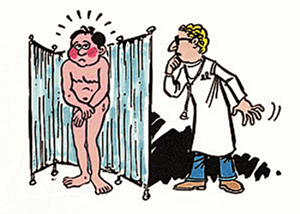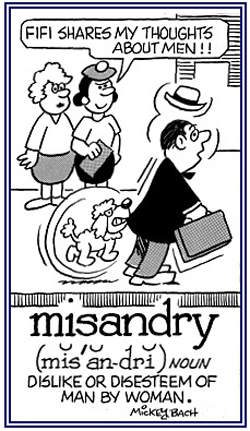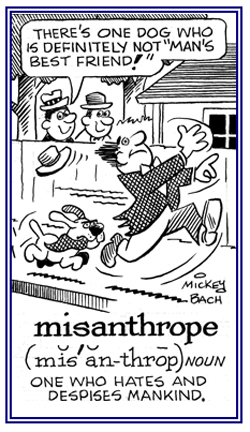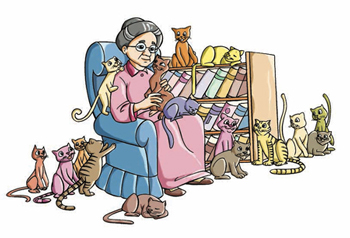computermisia
(kuhm PYOO tuhr MIS ee uh) (s) (noun), computermisias
(pl)
1. An intense dislike or a pathological hatred of cyber equipment:
Computermisia causes such a dread of having anything to do with computers, or computerization, that some people have symptoms of nausea, dizziness, cold sweat, and high blood pressure.
2. Etymology: from Latin
computare, "to count, to sum up; from
com-, "together" +
putare, "to count, to reckon, to consider" + Greek
misos, "hatred".

iatromisia
(igh AT roh MIS ee uh) (s) (noun), iatromisias
(pl)
1. An intense aversion for the medical profession or for medical doctors: Jane was suffering from
iatromisia; so, she always became very tense and anxious just with the thought of going to any doctor; and, although she didn't go very often, when it was absolutely necessary, she always asked her best friend to go with her.
One fear or iatromisia about going to see doctors is because patients associate them with illnesses or injuries and so they are afraid of getting germs or diseases from them or other patients who are in the waiting room.
2. Etymology: from Greek iatro-, "physician, medicine" + Greek misos, "hatred"; from miseo, "I hate".
iatromisiac
(IGH atroh MIS ee ak) (s) (noun), iatromisiacs
(pl)
A person who abhors going to see a doctor or any other medical person: Some
iatromisiacs fear undressing in front of others and so they hate going to doctors because they know that patients are often required to disrobe during a physical exam.
There are iatromisiacs who become so upset or anxious just by being in the doctor's office that their blood pressure increases, a phenomenon known as "white coat" hypertension.

logomisia
(LOH goh MIS ee uh) (s) (noun), logomisias
(pl)
A disgust or abhorrence of certain words or for a particular word: Because Linda often connected the term "argument" with bad memories between her parents, that started with normal conversation then developed into loud and angry voices, all of which turned her into a person with logomisia.
misandria
(s) (noun), misandrias
(pl)
Often a woman who has an extreme dislike of males, frequently based on unhappy experiences as to how she was treated as a child by her father: Although her parents had been divorced for more than two years, 17-year-old Diana still didn't want to go out with boys because she recalled her father mistreating her mother and being very loud and aggressive; and as a result, she developed a case of misandria for all men by not trusting any of them.
misandrist
(s) (noun), misandrists
(pl)
Those who have a hatred of men; especially, women who can't tolerate them because of some past infidelities or mistreatment: Some women got together and formed a club based on their distressful experiences with men which was called "The club for misandrists".
misandronist
(s) (noun), misandronists
(pl)
A fanatical person who has the belief that men are the primary cause of all of the world's problems: Anita had read about misandronists in a magazine, in which it said that generally the world could be ruled more successfully and peacefully by women because there have been so many hostilities between nations ruled by men which have caused too many armed conflicts and wars.
misandrous
(adjective), more misandrous, most misandrous
Pertaining to the loathing of men in general and; sometimes, especially for some particular man: Since her breakup with her husband, Kelly has serious misandrous feelings towards him that are filled with abhorrence and she never wants to have anything to do with him again.
misandry
(s) (noun), misandries
(pl)
1. A hatred of, or an animosity, towards a man or men in general: Some women have been so mistreated by certain males that they have strong
misandries for all of the other masculine genders, too.
2. An extreme dislike of men, frequently based upon unhappy experiences or upbringing as a child: Some authors have used the topic of
misandry in their novels, as Charles Dickens did in his novel
Great Expectations when Miss Havisham, characterized as being a
misandry, because she was so devastated when the man she expected to marry never showed up and so she had an animosity towards men all the rest of her life.
 © ALL rights are reserved.
© ALL rights are reserved.
Go to this Word A Day Revisited Index
so you can see more of Mickey Bach's cartoons.
misanthrope
(MIS-uhn-throhp, MIZ-uhn-throhp) (s) (noun), misanthropes
(pl)
1. Someone who has a hatred or distrust of all of mankind: After seeing terrible news on TV and reading the newspapers about the horrible wars in the world which never seem to end, it's no wonder that some people become
misanthropes, giving up all hope and faith that the world will someday be peaceful again.
2. Anyone who avoids social contacts with people whenever possible: Irene was always a very shy person, even when she was a child; and as a grown-up, she had a tendency to be a
misanthrope because she preferred being alone at home and not with other people.
3. Etymology: from Greek
misanthropos, "hating mankind"; from
misein, "to hate" +
anthropos, "man".
A misanthrope is a person who always believes the worst about other people, at first, and never changes his or her mind.
Someone who has little faith in mankind, and even less in womankind.
—Based on quotes by
Evan Esar, Esar’s Comic Dictionary
 © ALL rights are reserved.
© ALL rights are reserved.
Go to this Word A Day Revisited Index
so you can see more of Mickey Bach's cartoons.
misanthropic
(mis" uhn THROHP ik; miz" uhn THROHP ik) (adjective), more misanthropic, most misanthropic
1. Descriptive of a bitterness or contempt for humans in general: Gregory was a very
misanthropic person who generally abhorred the behavior of people because not only were the topics on politics in the newspapers and on TV so distressful, but also the articles about so much crime in the city where he lived.
2. Referring to avoiding the company of other people because of a strong preference to be alone and away from others: If anyone says something, or does anything, that is especially hostile or obviously untrue; this is probably coming from a
misanthropic individual.
In Walden, the author, Henry David Thoreau, describes his misanthropic and solitary life in the woods, where he lived alone, at least a mile away from any neighbor and had a quiet and independent life.
misanthropical
(adjective), more misanthropical, most misanthropical
1. A reference to having a hatred of people as a rule: Some children have had very disturbing experiences with their parents, not knowing when to trust them nor to believe what they have said, because their actions have often proven to be the opposite; so, it certainly wouldn’t be surprising if such young people decide to lead misanthropical lives.
2. Characterized by believing the worst about human nature and motives: As a misanthropical person, Burton usually stayed away from people as much as possible; so, he only left his apartment to go shopping for necessities very early in the morning and he earned a living by working with his computer at home instead of associating with others at a job site.
misanthropically
(adverb), more misanthropically, most misanthropically
Conveying an animosity for, or aversion to, all mankind or people: Jerome is misanthropically avoiding everyone by hiding in a cave and surviving on whatever he can find in the forest to eat because he doesn't want anything to do with any other person.
misanthropism
(s) (noun), misanthropisms
(pl)
A significant lack of respect or regard for the human species: There are some individuals who have misanthropisms for other inhabitants of this world as indicated by the multitudes of cruelties we keep hearing about in the news.
misanthropist
(mis AN thruh pist; miz AN thruh pist) (s) (noun), misanthropists
(pl)
A strong pessimistic distrust of humans as expressed in thoughts and behaviors: As a
misanthropist, the elderly lady preferred to be surrounded by her cats and had very little to do with people.

—Much of the information for the definitions in this miso- unit came from
-Ologies & -Isms, 3rd Edition; Laurence Urdang, Editor in Chief;
Gale Research Company; Detroit, Michigan; 1986.
and
Psychiatric Dictionary by Robert Jean Campbell, M.D., 7th Edition;
Oxford University Press; New York; 1996.
Related "hate, hatred" word sources:
odi-;
stygio-.






